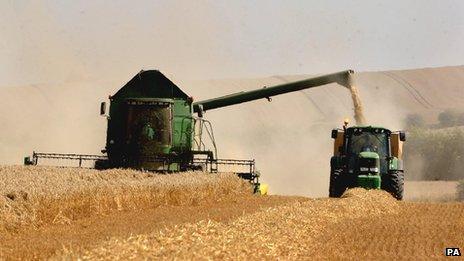EU farm subsidy reform criticised by MEPs
- Published
The BBC's Chris Morris explained in June why the farm budget is such a thorny issue for the EU.
Leading UK Conservative and Green MEPs have criticised a deal to reform EU farm payments, saying it falls short of green targets and perpetuates big differences in farmers' income.
It allows 15% of environmental spending to be switched to direct farm support.
European Parliament negotiators say the deal reached , externalwith EU ministers is final. The parliament's agriculture committee will vote on it on Monday.
The big centre-right and centre-left blocs of MEPs support the package.
A top negotiator for the centre-left Socialists and Democrats (S&D), Luis Manuel Capoulas Santos, insisted that about one-third of payments would still go on environmental measures.
But he said he was unhappy about letting governments transfer some rural development funding to the direct farm payments budget.
"We are not very happy with the final result - it's a shame the Council [EU ministers] was so intransigent on that... but on its own it's not a good enough reason to reject the whole agreement," he said.
In addition, MEPs' calls to set an upper limit on farm subsidies were rejected, during the months of tough negotiations with the Council.
'Illogical' transfers
The direct payments to farmers - known as the Common Agricultural Policy (CAP) - make up most of the EU's agriculture budget. Nearly 40% of total EU spending is allocated to agriculture.
Protection of wildlife and other environmental measures generally come under the rural development budget - called "pillar two". But the direct payments to farmers - "pillar one" - already dwarf such spending and Europe's big agricultural firms and landowners are major beneficiaries.
Under the new deal, EU member states can transfer 15% of rural development funding to pillar one. But that can reach 25% in countries where direct farm payments are below the EU average.
The UK Conservative group's agriculture spokesman, James Nicholson MEP,, external said it was "illogical" to allow such transfers in countries which receive above-average farm payments.
"Farmers from different countries will compete in the same market place but with widely varying levels of support from the EU," he said. "The CAP will be made more bureaucratic, complex and focused on the wrong priorities."
The plan is to spend about 50bn euros (£42bn; $65bn) annually on agriculture in 2014-2020.
Jose Bove MEP , externalof the Greens called the reform package "a massive missed opportunity for overhauling the EU's agriculture policy".
"Huge farming businesses which do not need the funding will continue to get big pay cheques, whilst depriving other sustainable areas of the CAP from funding," he said.
"The rules for 'greening' the CAP are riddled with exemptions, so they will fail to truly make EU agriculture sustainable," he said.

Oat harvest near Cambridge, UK: Big farms do especially well out of EU subsidies
Flexibility
It is the first time the parliament has been able to influence EU farm spending in a significant way.
The European farmers' co-operative Copa-Cogeca welcomed the reform package, saying it hoped for a transitional phase next year and full implementation in 2015.
The package "will reinforce farmers' position in the food chain and enable farmers to get a better return from the market", it said.
Under the new system, there will be a 5% mandatory cut in payments to farmers who currently get more than 150,000 euros (£126,000; $202,000) in annual payments from the EU.
But states will have considerable flexibility in how they allocate the subsidies.
Mr Santos said the reformed CAP package included a special scheme for young farmers, "to respond to the very serious problem of ageing of the agricultural population".
He also pointed to the higher subsidies for less developed regions as a success.
The EU co-funds rural development projects with member states' governments. In the poorest regions, including some Aegean islands, the EU share of that funding will be up to 85%. The Council said its agreement to that was "a major concession".
Under the reforms, governments will also have to exclude so-called "sofa farmers" - landowners who do not match the definition of an "active farmer".
The current payments system is largely based on land area and past subsidy levels, meaning that landowners like airports and sports clubs, which do not farm, have been getting subsidies on the basis of their grasslands or other eligible land areas.
- Published21 June 2013
- Published1 July 2013
- Published14 May 2013